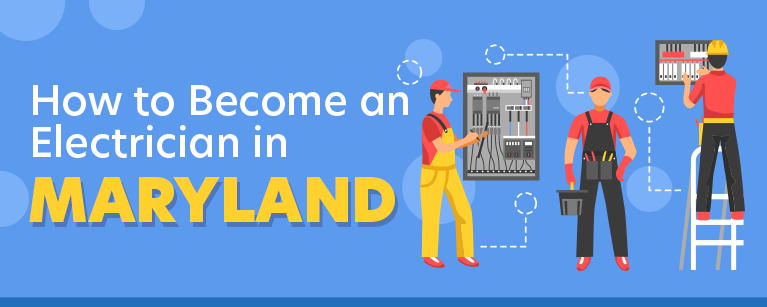
Becoming an electrician is ideal for those who take pride in solving problems, have a strong work ethic, and enjoy having consistent work!
Electricians can expect to earn a steady income and have a diverse range of job opportunities as well.
If this sounds like something you’re interested in, keep reading to find out how to become an electrician in Maryland!
Table of Contents
Electrician Job Duties and Skills in Maryland
Electricians need to have a broad range of knowledge on several topics and the ability to perform a diverse set of tasks.
According to the U.S. Bureau of Labor Statistics,
A few duties that electricians in Maryland may need to be able to perform include:
- Reading blueprints or technical diagrams
- Directing and training workers to install, maintain, or repair electrical wiring or equipment
- Identifying electrical problems using a variety of testing devices
Some soft skills that electricians need to possess include:
- Excellent time management
- The ability to work well within a team
- Leadership skills
- Customer service skills
- Critical thinking skills
While some hard skills include:
- Possessing knowledge of electrical codes
- The ability to install and connect wires, switches, outlets, and circuit breakers
- Knowledge of electrical safety procedures
- Knowledge of a wide variety of electrical systems
- The ability to identify various electrical issues and figure out how to solve them
Electricians need to be flexible, adaptable, and prepared to learn a large variety of skills to expand their overall knowledge in the profession.
How to Become an Electrician in Maryland
Becoming an electrician in Maryland will take some time, but with hard work and dedication, you can make it happen!
Maryland has one of the most unique licensing requirements, and according to the Maryland Department of Labor, in order to obtain a license, you must have at least 576 classroom hours and 8,000 hours of work experience.
But how should you go about meeting these requirements?
A Fair Warning
Obtaining an electrical license in Maryland is not a one-size-fits-all process.
Depending on your location or county, the steps to becoming an electrician in Maryland may vary.
The process also depends on you and your goals.
For example, would you like to get a journeyman license, or would you be okay with only possessing a restricted electrician license, which would only allow you to work in the county in which you obtained the license?
Different strokes for different folks.
But here are some of the most common paths to becoming an electrician in Maryland!
Join an Apprenticeship Program
Apprenticeships are great for people who want to take a more hands-on approach to learning.
You’ll spend most of your time working under a licensed technician and learning on the job.
This is great because Maryland requires you to have years of work experience before being able to apply for a license.
It’s also a great option for people who want to get paid while they learn.
Complete Your Hours
To obtain most electrician licenses in Maryland, you’ll need to acquire anywhere from two to seven years of work experience.
This means you’ll need to make sure that you’re keeping track of your hours and that you complete all necessary working hours in your apprenticeship.
This is an extremely important step!
Go to a Technical or Vocational School
If you’re not a fan of apprenticeships, you can go through a more traditional education route instead.
You can earn a certificate or degree by attending a technical or vocational school.
You’ll still be able to get your hands dirty by training on the job because you can choose to pursue an apprenticeship alongside attending school, or you can try out an externship.
But going this route is a little different than choosing an apprenticeship because it’s more school and study-focused.
Much more of your time will be spent in a classroom with a professor and classmates, so if you do better in a school setting, this is the option for you.
Choose Your School and Program Carefully
Make sure to do thorough research when deciding on which school to attend and which degree or certificate to pursue.
Some schools offer more specialized certificates and degrees that focus solely on one area.
Others offer more well-rounded coursework that covers a broad range of skills, such as commercial, residential, and industrial wiring, plus how to read blueprints, use electrical tools, and keep up with codes.
Ultimately, you’ll want to go with a program that can teach you a wide variety of skills and broad knowledge of the field.
Training Programs for Electricians in Maryland
Here are some institutions in Maryland that offer electrical training programs.
Baltimore Electrical JATC
An excellent choice for those interested in apprenticeship, Baltimore Electrical JATC was the first registered trade program in the state of Maryland.
According to jatc24.org, “The five-year program includes both in-person coursework and on-the-job training with a certified NECA contractor for a well-rounded introduction to the trade.”
After completing your apprenticeship, you can also pursue further education by taking more offered courses.
Lincoln College of Technology-Columbia

The Lincoln College of Technology-Columbia offers the Electrician Training Program, which offers 1,200 hours of in-depth instruction on power generation and distribution, blueprint reading, and semiconductor applications.
Students will also learn about more advanced topics such as electrical codes, telecommunications, residential and commercial wiring, and OSHA requirements.
According to Lincolntech.edu, instruction is broken down into 864 hours of lecture and 336 hours of hands-on shop hours.
When students have completed this program, they will be ready to join the industry as an apprentice.
Howard Community College

Howard Community College offers an electrical apprenticeship that allows students to work full-time as electricians in partnership with local employers while completing coursework.
This apprenticeship lasts for four years and has a focus on electrical theory, equipment, and safety protocols for use in both commercial and residential environments.
This program is a great choice for any aspiring electricians!
Chesapeake College

Chesapeake College offers students the opportunity to become certified electricians through a two-year program filled with comprehensive courses.
According to chesapeake.edu, the program’s objectives include making sure that students gain all 60 credits required to obtain electrician certification, the ability to obtain licenses and permits for work, and the knowledge that will make them highly employable.
The program teaches safety procedures and protocols, maintenance procedures, an understanding of electrical currents, different types of wires and wiring, and more.
| School Name | Address |
|---|---|
| Baltimore Electrical JATC | 2699 W Patapsco Ave, Baltimore, MD 21230 |
| Lincoln College of Technology-Columbia. | 9325 Snowden River Pkwy, Columbia, MD 21046 |
| Howard Community College | 10901 Little Patuxent Pkwy, Columbia, MD 21044 |
| Chesapeake College | 1000 College Cir, Wye Mills, MD 21679 |
Electrician Salaries in Maryland
After you’ve completed your technical program or apprenticeship, all that’ll be left to do is find a job, which shouldn’t be too difficult!
There are plenty of jobs waiting to hire you, and they all pay a decent wage!
Salaries vary city by city and, of course, depend on your experience, but even entry-level electricians in Maryland can expect to make a nice profit.
As you gain more and more experience, you can expect to make around $60,000 a year or more.
Annual Salary Range:| Location | Avg. Annual Salary |
|---|---|
| College Park | $72,647 |
| Rockville | $72,560 |
| Gaithersburg | $72,452 |
| Bowie | $72,495 |
| Frederick | $70,097 |
| Salisbury | $69,378 |
| Annapolis | $69,151 |
| Baltimore | $67,087 |
| Hagerstown | $66,330 |
| Cumberland | $59,883 |
Regional Salary in Maryland
| Region | Employed | Avg. Annual Salary | Avg. Hourly Pay | Top 10% Annual Salary | Bottom 10% Annual Salary |
|---|---|---|---|---|---|
| Baltimore-Columbia-Towson, MD | 6,750 | $67,140 | $32.28 | $103,820 | $38,310 |
| California-Lexington Park, MD | 280 | $64,800 | $31.16 | $94,900 | $37,710 |
| Cumberland, MD-WV | 120 | $61,340 | $29.49 | $90,160 | $38,030 |
| Hagerstown-Martinsburg, MD-WV | 440 | $65,220 | $31.36 | $91,840 | $42,640 |
| Salisbury, MD-DE | 690 | $56,680 | $27.25 | $77,020 | $38,490 |
* Employment conditions in your area may vary.
Frequently Asked Questions
How long does it take to become an electrician in Maryland?
Becoming an electrician in Maryland is a lengthy process.
Most technical and apprenticeship programs last between two to five years, and you must have at least seven years of experience in providing electrical services under the supervision of a master electrician before you’ll be able to obtain a license.
Can I do my own electrical work in Maryland?
Only if you’ve obtained an electrical permit.
What is the hourly rate for an electrician in Maryland?
It depends on experience and expertise, but most electricians in Maryland can expect to get paid anywhere between $20 and $30 an hour. $24 per hour is the average pay rate.
Electrician Info by State
- Alabama
- Alaska
- Arizona
- Arkansas
- California
- Colorado
- Connecticut
- Delaware
- Florida
- Georgia
- Hawaii
- Idaho
- Illinois
- Indiana
- Iowa
- Kansas
- Kentucky
- Louisiana
- Maine
- Maryland
- Massachusetts
- Michigan
- Minnesota
- Mississippi
- Missouri
- Montana
- Nebraska
- Nevada
- New Hampshire
- New Jersey
- New Mexico
- New York
- North Carolina
- North Dakota
- Ohio
- Oklahoma
- Oregon
- Pennsylvania
- Rhode Island
- South Carolina
- South Dakota
- Tennessee
- Texas
- Utah
- Vermont
- Virginia
- Washington
- West Virginia
- Wisconsin
- Wyoming










